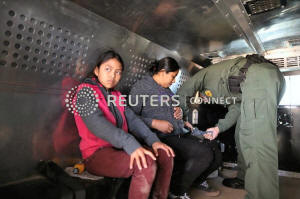Guatemala agrees to new migration measures to avoid Trump sanctions
threat
 Send a link to a friend
Send a link to a friend
[July 27, 2019]
By Steve Holland and Sofia Menchu
WASHINGTON/GUATEMALA CITY (Reuters) - U.S.
President Donald Trump on Friday said he agreed to drop the threat of
economic sanctions against Guatemala after the country said it would
implement new measures aimed at reducing U.S. asylum claims from
migrants fleeing Honduras and El Salvador.
The Trump administration has grappled with a surge of mainly Central
American migrants claiming asylum at the United States' southern border
with Mexico, an influx that has made it difficult for Trump to restrict
immigration as he promised when he was elected.
Many of his initiatives have been blocked by court orders, and the
American Civil Liberties Union (ACLU) said the group would likely
challenge the Guatemala agreement in court.
Nearly 200,000 people traveling in families from El Salvador and
Honduras have been apprehended at the U.S. border since October, with
most passing through Guatemala and Mexico along the way.
Mexico agreed last month to deploy troops to try to stanch the flow
after Trump threatened to impose tariffs on exports.
Trump had pushed for Guatemala to sign a so-called safe third country
agreement to require asylum seekers passing through on their way to the
United States to first pursue safe haven in Guatemala.
When an initial agreement fell through last week, Trump had threatened
to impose tariffs, ban travelers and hit remittances with fees.
On Friday, he watched as acting Homeland Security Secretary Kevin
McAleenan signed an agreement with Guatemala's minister of government,
Enrique Antonio Degenhart, in the Oval Office.
"They're doing what we've asked them to do," Trump told reporters,
calling Guatemalan President Jimmy Morales a "terrific guy."
"We have other great countries who are going to be signing on also," he
said, without providing further details.
Morales said on Facebook that the agreement had headed off the threat of
"drastic sanctions."
Guatemala's Constitutional Court had ruled that a safe third country
deal could not be signed without prior approval from the country's
Congress, which is on a summer recess.
The Guatemalan government said in a statement that Friday's deal - which
it did not call a safe third country pact - would allow its citizens to
apply for temporary visas to work in the U.S. agricultural sector, and
in the medium- to long-term, would allow for work visas for the
construction and service sectors.
McAleenan said there were still "several procedural steps" required in
both countries to ratify the deal and put it into effect, which he said
he expected would occur in coming weeks.
LEGAL CHALLENGE
McAleenan told reporters the pact would protect migrants "at the
earliest possible point in their journey," noting U.S. immigration
judges reject asylum claims from most Central American migrants.
"If you have a Honduran family or an El Salvadoran national, instead of
them having to pay a smuggler, come all the way to our border to seek
asylum, when they arrive in Guatemala they’re in a country that has a
fair proceeding for assessing asylum claims and that’s where they should
make that claim," he said.
[to top of second column]
|

Guatemalan migrants Ismelda Cipriano, 31, and her daughter Petronila
Cipriano, 12, sit in a truck after surrendering to U.S. Border
Patrol Agents in El Paso, Texas, U.S., March 5, 2019. REUTERS/Lucy
Nicholson

Migrants who arrive in the United States who have not first sought
asylum in Guatemala will be returned to Guatemala, McAleenan said.
One of the poorest countries in the Americas, Guatemala has little
experience receiving large numbers of asylum seekers and a large
wave of refugees would strain limited resources.
Just 262 people applied for refugee status in Guatemala between
January and November 2018, according to data from the U.N. rights
agency UNHCR.
A lawyer for the ACLU said the group would likely challenge in court
any move to deny migrants asylum based on an agreement with
Guatemala.
"Congress made clear that the agreement has to provide a safe, fair
and full asylum process," said Lee Gelernt, deputy director of the
ACLU's Immigrants Rights Project, who has led several lawsuits
blocking Trump's immigration policies.
"But Guatemala can neither offer a safe nor fair and full process
and nobody could plausibly argue otherwise," Gelernt said.
Meghan López of the International Rescue Committee in El Salvador
said the agreement could leave people in danger.
"Guatemala is not safe for Guatemalans, and it is not safe for those
who have fled seeking asylum from elsewhere in the Northern
Triangle, nor for those who could now be returned to a country not
their own," she said in a statement, referring to Guatemala,
Honduras and El Salvador which have some of the highest murder rates
in the world.
McAleenan noted the U.S. law that provides for safe third country
agreements focuses on process rather than safety.
"There are obviously places in Guatemala and in the U.S. that are
dangerous. But that does not mean that it doesn't have an
appropriate process, a full and fair process, for asylum seekers to
present themselves for protection under international law," he said.
Separately, the Trump administration on Friday instructed U.S.
asylum officers to consider whether "internal relocation" within
migrants' home countries was an option.
The new guidance said that "private violence is not pervasive across
the entirety of each Northern Triangle country," suggesting that
failure to attempt internal relocation could be suitable grounds for
rejecting an asylum case.
(Reporting by Steve Holland, Sofia Menchu and Dan Trotta; additional
reporting by Eric Beech, Dave Graham, Frank Jack Daniel, Mohammad
Zargham, Tim Ahmann and Mica Rosenberg; writing by Roberta Rampton;
editing by Susan Thomas and Sonya Hepinstall)
[© 2019 Thomson Reuters. All rights
reserved.]
Copyright 2019 Reuters. All rights reserved. This material may not be published,
broadcast, rewritten or redistributed.
Thompson Reuters is solely responsible for this content. |